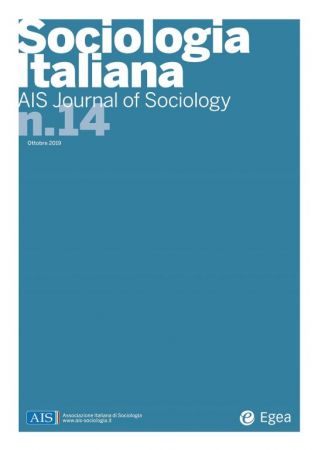AIS
2019/14
Emozione e autopoiesi relazionale: l’amore come problema sociologico (Emotions and relational autopoiesis: love as a sociological issue), di G. Lampredi
L’articolo ha come oggetto principale una proposta di riordino dei concetti di relazione e affettivit? all’interno del quadro delle scienze sociali, attraverso implicazioni che provengono dalla teoria dei sistemi complessi. Nell’articolo, si propone infatti di vedere i concetti di relazione e di affettività (emozioni, sentimenti e stati d’animo) come profondamente connessi e auto-rigenerativi. Si sostiene che la relazione, intesa come fenomeno emergente tra due o più agenti (ma anche tra sistemi più grandi), sia il contesto dove vengono evocate le affettività. Ma è vero anche il contrario, poiché le relazioni vengono create, rigenerate e distrutte in base alle emozioni. Esiste, infatti, un rapporto di circolarità a-causale tra l’affettività e le relazioni. Scopo del saggio è suggerire che alcuni concetti, tra cui l’ amore , non siano sentimenti e, quindi, proprietà dei soggetti, ma vadano assegnati, su un piano osservativo, a un livello logico più ampio che è quello della relazione costituita. La paura, la rabbia e la sorpresa possono avere significati direzionali diversi, in base al contesto relazionale nel quale si osservano. L’articolo si propone di discutere queste argomentazioni facendo riferimento alle riflessioni sociologiche di Georg Simmel, Niklas Luhmann, Erving Goffman, Pierre Bourdieu, Pierpaolo Donati e al pensiero complesso di autori come Gregory Bateson e Francisco Varela.
This paper’s main focus is a proposal for reorganizing the notions of «relationship» and «affectivity» (emotions, feelings and moods) in the framework of the social sciences, influenced by the theory of complex systems. In this context we suggest viewing the two concepts as intertwined and self-sustaining. We argue that relationships – intended as a phenomenon arising between two or more agents (but also among larger systems) – are the context where affectivity is generated. Though the reverse is also true, because relationships are built, balanced, and also terminated by emotions. Here we assert that there is a non-causal, circular bond between affectivity and relationships; it is also argued that some concepts, like those of love , trust and power , are notions that should be observed on a broader level – that of the established relationship. These three elements can be viewed as contexts for affectivity, which imbue affectivity with different meanings. Fear, rage and surprise can acquire various meanings, depending on the relational context where they are observed. The paper discusses these issues with the contribution of sociological theory (among others, Georg Simmel and Pierre Bourdieu) and various ideas from the work of Gregory Bateson and Francisco Varela on complexity.
Keywords: Sociologia relazionale, Sociologia delle emozioni, Autopoiesi, Amore, Costruzionismo relazionale, Relational sociology, Emotions, Autopoiesis, Bourdieu, Bateson
DOI: 10.1485/AIS_2019/14_3443537
Pagine 55-70
L'ACCESSO A QUESTO CONTENUTO E' RISERVATO AGLI UTENTI ABBONATI
Sei abbonato? Esegui l'accesso oppure abbonati.
